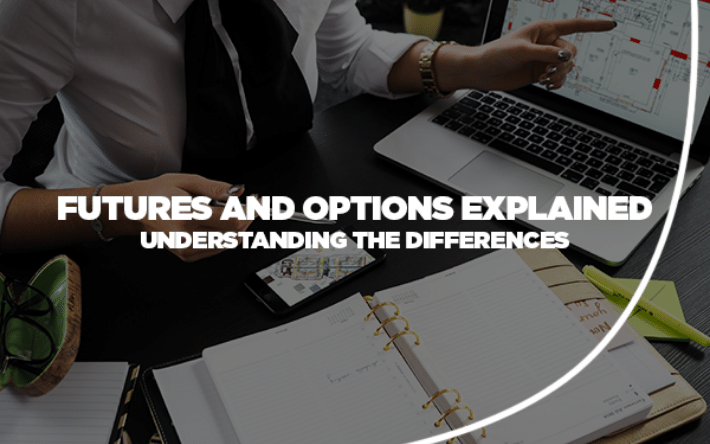Introduction
When getting introduced to trading, it is more likely that you get your journey begin in financial markets that involve equity trading like stocks or forex. This is indeed a safe and suitable start to trading so that the freshers will not feel too overwhelmed due to the huge amount of new information.
As you spend time and make your way through all ups and downs of the markets, you will soon realize that some other financial markets require different approaches but promise even attractive profits to those who trade on daily basis: futures and options. What exactly are those contracts and how to trade with ‘futures and options’? How will they affect your choices in your trading plans? Let’s find out!
Futures and Options: Explained
Similarly, futures and options are contracts for buying or selling underlying assets – including shares, currencies, commodities, and the like – at a predetermined price also known as the strike price before the expiration date. However, While futures give the buyers both the right as well as the obligation from buying such contracts, options do not.
Unlike other financial markets that involve equity trading, futures and options are known as ‘derivative products’. While stocks and the like are circulated on the markets and are directly impacted by the fluctuating movements, contracts like futures and options do not have a value on their own. Futures contracts are also considered margin transactions, which will soon be explained in a later section.
As derivative products, they are primarily used by investors to hedge their direct investments against any risky price movement of the underlying assets. Broadly speaking, it is like making bets on whether the price movements will move in a certain direction, which results in considerable amounts of profits that can either be a net income or cover the loss incurred by the price changes.

The Difference Between Futures and Options
Despite the mutual commonalities shared by the two derivative products, futures and options have striking differences that investors should keep in mind when choosing the most suitable markets besides the more traditional ones.
The obligation
While futures give the buyers both the right and the obligation to buy or sell the underlying assets, options do not. Without the obligation during the trade, the buyer can just simply choose not to exercise the option should he senses the situation will turn unfavorable to him. In this case, his loss is only limited to the premium paid to the option seller.
The exercise date
In the case of options, you can freely exercise some contracts at any time as long as it is before the expiration date. This is because the option buyer holds no obligation to exercise their contract as stated above. On the other hand, the future buyer must either expand the duration of the position or conclude the transaction to realize its profit or loss on or just before the expiration date – often called the ‘final trading day’.
The payment
To buy an option contract, you have to pay the seller a predetermined amount called premium even when you choose not to exercise the option. With futures, you are required to deposit a ‘margin’ – a certain percentage of the total value of the contract – to the broker when opening a future position.
For instance, let’s say you are buying several stocks worth $10,000 with a determined margin of 30% (equal to $3,000). You then must deposit this amount to your broker. If the stock price manages to rise 20% (making it $12,000 now), that means you make $2,000 by using $3,000. The profit margin is now approximately 67% instead of 20% like the number you would get if you hold the underlying asset.
The possible risk
In a bear market, investors can just simply opt out and choose not to exercise their options, theoretically helping them reduce the possible risk at the cost of the amounts of premium paid to the sellers. In contrast, the holders of the future are obligated to exercise the contracts at the specified date, regardless of the stock price at the time. This makes the investors have almost no means to compensate for the loss if the price movements get unpredictably out of control.
Different Types of Futures and Options
Futures are commonly divided into smaller types according to that of the underlying assets, including equity futures, currency futures, interest rate futures, index futures, commodity futures, and so on. These are aligned with the same set of rules for buyers and sellers.
On the other hand, options can be categorized into 2 different types:
- Call option: granting you the right, but not the obligation, to buy the underlying asset at the strike price before the expiration date
- Put option: giving you the right, but not the obligation, to sell the underlying asset with other conditions stated above

The Application of Futures and Options in Trading
How you can invest in future and options depends on the ways they are applied in actual trading, they can be classified into the following types of application:
Hedge
Hedging is a risk management strategy that involves trying to make profits from futures and options contracts to cover the possible losses from the underlying assets due to volatility.
In a bear market, hedging an investment requires locking in a contract at a certain strike price and a future date will possibly help the investor get a considerable gain to cover the loss from the direct investment should the stock price take a downtrend.
However, if the market price surges unexpectedly, the contract holder will experience guaranteed losses as well as lose all the profitable opportunities from the uptrend since he cannot get rid of the contract before the expiration date.
Such a situation also happens to the option buyer but is not as financially harmful because the contract holder can choose to exercise the option and pull out of the deal in the case of favorable price swings any time he wants.
Speculation
When a trader aims for speculation, he positively expects the stock price of a certain stock to rise and, therefore, tries his luck by buying a short position in the derivative markets. If that very asset manages to increase its value, the trader will then proceed to sell it at a later date at a higher price and make a profit.
A long position can also be implemented in this case as a reduced price asset which is collected by traders who are expecting a bounce back for profits in later periods despite its current downward movements.
Arbitrage
Arbitrage takes advantage of the price differences in the markets and the process of simultaneously buying and selling financial assets or their derivative forms to make a profit. This happens thanks to the imperfections of the markets. With futures and options, their quoted price includes the current market price and the cost of carrying – refers to any price difference from holding the contracts to the predetermined date.
As arbitrageurs successfully make profits, they eventually remove all the price differences between trading conditions due to the changes in the demand and supply patterns and the movements toward the equilibrium point.
Conclusion
Futures and options are indeed irresistibly attractive to a large number of traders as they grant your opportunities for possible profits even without actually owning the stocks. However, they are still notorious for high risk if investors fail to make the right predictions by not being able to utilize futures and options data analysis. In some cases, the losses can be unlimited. So, having a thorough understanding of futures and options and keeping a clear mind for suitable strategies is nevertheless important to survive among the harsh trading conditions out there.


